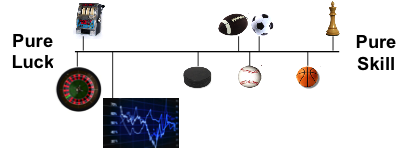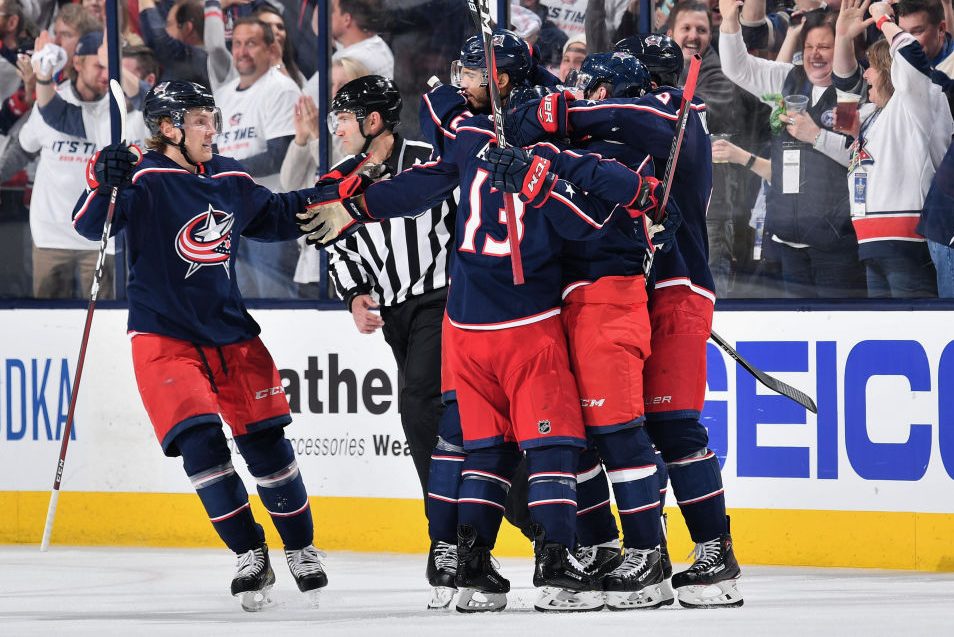For the first time in history, the top seeds in the NHL’s Eastern and Western Conferences were both eliminated in the opening round of the Stanley Cup playoffs.
The Tampa Bay Lightning, who matched an NHL record with 62 regular-season wins, and the Calgary Flames, who had 107 points in the regular season, combined for only one win in their respective first-round losses to the Columbus Blue Jackets and Colorado Avalanche.
While Tampa Bay and Calgary’s simultaneous first-round exits are historic, they aren’t actually all that surprising because, more so than in any of the other four major sports, the best teams do not always win in the NHL.
Why? It comes down to puck luck — or lack thereof.
Since there are so few scoring opportunities in hockey as compared to other sports, a lucky break or puck bounce early in an NHL playoff game can go a long way to deciding the contest’s outcome. By contrast, in the NBA, a 3-point shot from half-court at the end of the first quarter has a relatively small impact on a game’s final margin.
Also, since NBA players have so many more opportunities to score in general, the results are a much better true reflection of the skill of the players in a given series. The best have an opportunity to be the best.
Due to hockey’s constant line changes, NHL stars log less playing time than stars in other sports which makes it far more likely a lucky or unlucky fluke can make a big impact on the game.
The author of The Success Equation: Untangling Skill and Luck in Business, Sports, and Investing Michael Mauboussin, explained further to Wired in 2012,
“Hockey has six players on the ice at a time while basketball has five players on the court, seemingly similar,” he said. “But great basketball players are in for most, if not all, of the game. And you can give the ball to LeBron James every time down the floor. So skillful players can make a huge difference. By contrast, in hockey, the best players are on the ice only a little more than one-third of the time, and they can’t effectively control the puck.”

Luck also plays a larger role in the NHL playoffs because of how little having home ice matters in the postseason. According to FiveThirtyEight, NHL teams actually see their home-ice advantage decrease slightly in the playoffs as compared to the regular season. That lack of an advantage means if a visiting team is hot and their hosts are not, they’re a good bet to win despite being on the road.
Never was that more apparent than when the eighth-seeded Los Angeles Kings, the 11-best team of the 2011-12 regular season, lost only one game outside of L.A. en route to their Stanley Cup triumph. In addition to being great on the road, that Kings team got lucky all the way to the Cup Final as they got to take on the ninth-best and sixth-seeded New Jersey Devils for Lord Stanley’s trophy in a six-game series L.A. wrapped up with a lopsided 6-1 home win.
Another reason luck plays such a big factor in the NHL playoffs, especially as compared to the NBA’s postseason, is parity. Though NHL teams can be far apart in the standings, their skill levels are usually much closer together than their NBA counterparts. When that’s the case, luck plays a much bigger role in leveling the playing field so more games would be needed to accurately determine which team is actually the best.
Skidmore College statistician Michael Lopez, who authored the paper “How Often Does the Best Team Win? A Unified Approach to Understanding Randomness In North American Sport,” told the Pittsburgh Post-Gazette that the NHL would need to play 51-game playoff series “in order to approach the level of parity (or lack thereof) of the NBA playoffs.”
Think of that. To make sure an NHL series is actually decided by skill as opposed to puck luck, teams would have to play what equates to a third of season’s worth of games. Obviously, that’s never going to happen so Lady Luck should continue to be a huge presence in pro hockey’s postseason for the foreseeable future — at least in the early rounds.
Interestingly enough, while lucky underdogs commonly have their day in early in the NHL playoffs, ice water generally reaches its level by the time the Stanley Cup Final rolls around. In fact, the league has only seen 13 different franchises win the Cup over the league’s last 25 seasons (2004-05 was a lockout year).
After all, as it does in all facets of life, luck in the NHL playoffs runs out.
For an even deeper look into the role luck plays in hockey, basketball and other sports, check out this excellent video from Vox which cites some of the sources referenced above.
Taking all of that into account, there’s a very good chance this year’s NHL champion will be a road favorite that has a rabbit foot wedged in its collective skates and has also won a Stanley Cup or two at some point in the last 25 seasons.
Avalanche, anyone?
The Charge will help you move better, think clearer and stay in the game longer. Subscribe to our wellness newsletter today.



















